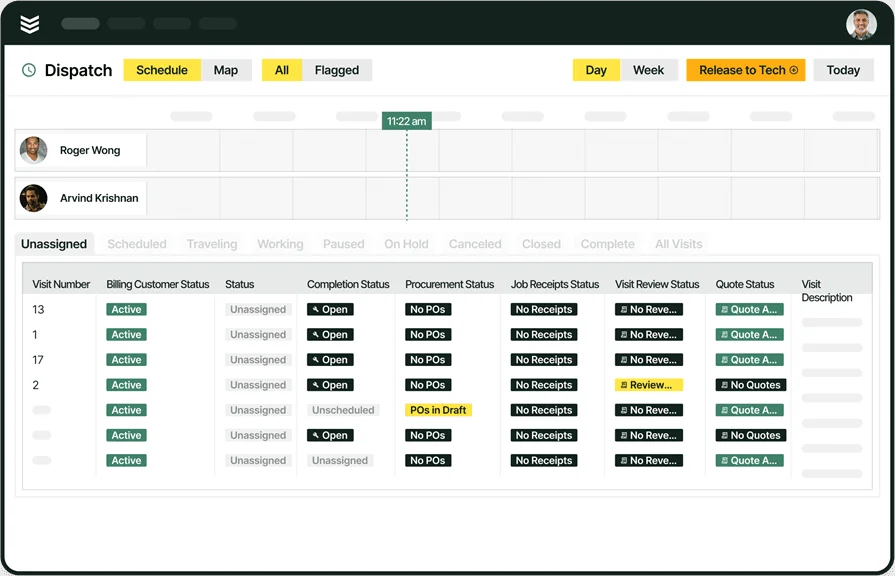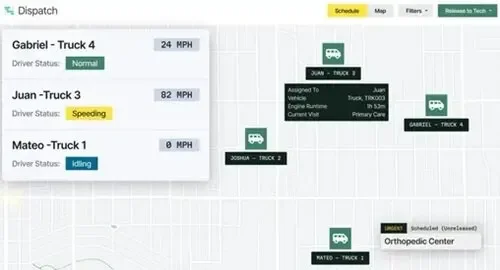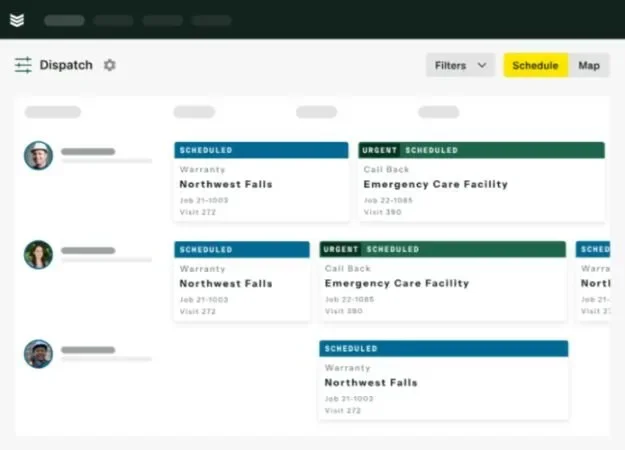Running electrical service jobs takes precision. You’ve got live wires, tight timelines, safety risks, and a crew spread across multiple locations. Double-bookings, missing job info, or last-minute changes can throw off the entire day. With the right electrical service booking software, you get every job, tech, and update organized in one place. That kind of control is what keeps the wheels turning for businesses in the electrical industry.
This guide is built for contractors who need reliable electrical contractor business booking software—tools that help assign work faster, cut delays, and give techs the info they need before stepping on site. Whether you’re coordinating routine maintenance or responding to urgent calls, this breakdown shows what works and what actually helps crews stay productive. Here’s what we’ll cover:
- Choosing the best electrical service booking software for your crew
- 6 key electrical service booking software features to look for
- 8 best electrical service booking software platforms
- 7 benefits of using electrical service business booking software
- 4 important FAQs about electrical service booking software–answered
Before diving into features or platforms, let’s get clear on what the job demands. Every electrical service business has different workflows, customer needs, and tech setups. Picking software without understanding how it supports that day-to-day work? That’s how things slip through. Let’s figure out what your operation needs first—so the tool you pick actually fits the way you run your jobs.
Choosing the best electrical service booking software for your crew
When you’ve got a team of electricians moving between job sites, timing matters. One missed detail in the schedule—an unconfirmed panel upgrade or a lost inspection window—can stall an entire day. That’s why electrical service booking software plays such a critical role. It keeps every dispatch, reschedule, and update right in front of your techs, no matter where they are. Whether you're handling quick-turn repairs or managing larger install timelines, choosing the right tool can tighten up the chaos fast.
Before locking in a platform, step back and look at how your team runs in the field. Every electrical contractor business booking software option works a little differently. The one that fits should support how your crew already works—and make that work easier to manage on the fly. Here are the angles that matter most:
- Scheduling flow – How do you currently assign jobs? Can this tool handle service calls, installs, and emergency dispatch in one place? Does it let your team respond to schedule changes while they’re still on-site?
- Crew load & growth – How many techs are running jobs now? If that number doubles, can this software keep pace? Can it handle staggered shifts, mixed job types, or multiple crews running at once?
- Customer updates – Can dispatchers push appointment confirmations, delay alerts, or "on the way" texts straight from the platform? Can customers reply or confirm through the same system?
- Performance visibility – Can you see if a breaker panel job took two hours longer than quoted? Which jobs are behind? Which techs are finishing faster than expected?
- Features – Can it support recurring inspections? Does it include drag-and-drop job assignments, quote-to-schedule tools, or route planning for multiple service zones?
Once you’ve mapped out how your jobs actually run, you’ll see what kind of electrical service business booking software fits best. Some tools bury you under features you’ll never touch. Others skip the basics your crew counts on. The next section walks through the core features that deliver in the field—so your booking software helps, instead of getting in the way.
6 key electrical service booking software features to look for
When you’re managing service calls across multiple zip codes with a crew of electricians, one bad handoff can throw off your whole day. That’s where electrical service booking software comes in—it holds your entire schedule together, from job dispatch to payment tracking.
The best tools aren’t just calendars. They let your team move faster, stay synced, and avoid rework. From scheduling emergency shutdowns to routing panel installations and tracking time on-site, the features below are built for how electrical pros actually work in the field.
1. Dispatching that adjusts in real time
Your dispatcher needs to know where everyone is and what’s coming next. With field service dispatch software, you get a live board that shows which techs are available, what jobs are open, and where delays might hit.
Let’s say one of your techs is tied up on a panel retrofit that’s running an hour long. Instead of making five phone calls and shifting jobs manually, your dispatcher drags the next job over to a free crew across town. Everyone’s schedule updates instantly, and the customer gets a new ETA before they even call.
2. Scheduling and updates straight from the field
Your crew doesn’t have time to check in with the office between jobs. With a technician mobile app, techs can view schedules, close out tasks, and send real-time updates from their phone. Say your team finishes a ceiling conduit run early and wants to knock out the next service call while they’re still nearby. Instead of calling it in, the tech updates their status on the app, sees the closest job, and confirms the dispatch—no hold music, no delays.
3. CRM with full job and site history
A solid CRM tool for contractors keeps job details, asset history, and contact info in one place—accessible to both the office and your field crew. For example, when your tech rolls up to a commercial property for a lighting circuit issue, they can pull up the last two service calls, see photos of the panel, and check which breakers were replaced last visit. That kind of info means faster repairs and fewer callbacks.
4. Quoting that turns into bookings
With quoting software, estimates don’t sit in limbo. Once a customer gives the green light, the quote flows straight into your dispatch calendar without double entry. Let’s say a tech finishes troubleshooting a failed breaker and builds a quote right from the job site. The customer signs it, and with one tap, it’s scheduled for the next open slot. No need to retype scope or pricing later.
5. Route planning that cuts drive time
Wasted windshield time kills productivity. With fleet management tools, your dispatcher can group jobs by location, factor in traffic, and reroute techs on the fly. Consider this: Three jobs pop up across the east side of town. One is a quick GFCI replacement, another’s an emergency power loss at a strip mall. With optimized routes, your dispatcher reassigns the closest tech to the power outage, keeping both jobs on track.
6. Invoicing and payments that move fast
Delayed billing slows everything down. With field-ready invoicing software and connected payment tools, your crew can wrap the job and bill the customer on the spot. Say your team installs a backup generator at a commercial site. Before they leave, the tech marks the job complete, the invoice auto-generates, and the customer pays by card—no paper trail, no follow-up calls from accounting.
Other useful features for electrical service businesses
The core tools handle dispatch, scheduling, quoting, and billing—but there’s value in features that add clarity and long-term support for the back office and field. These functions help electrical contractor business booking software offer more control over job flow, performance tracking, and recurring work. If you’re comparing platforms or thinking long-term, these extra features can tighten things up across your operation.
- Reporting and dashboards – Job reporting tools give visibility into job completion rates, tech performance, and service timelines. Helpful when you want to back your decisions with data instead of guesswork.
- Service agreements and recurring jobs – With service agreement tools, recurring inspections, maintenance contracts, and multi-visit jobs stay on schedule automatically—no missed dates or manual reminders.
- Pipeline tracking – Pipeline management lets your office follow leads, proposals, and follow-ups in one place, tying new business directly into your booking workflow.
- Technician time tracking – With time tracking software, you can log labor hours, monitor field productivity, and simplify payroll reporting—critical for staying accurate with job costing.
These supporting features help electrical service business booking software cover the gaps that slow down job turnaround, crew planning, or customer coordination.
8 best electrical service booking software platforms
There’s no shortage of software that promises to simplify job scheduling, but electrical service booking software isn’t one-size-fits-all. Whether you’re running high-volume commercial installs or managing residential repair calls, the best platform fits the way your team works in the field. These eight tools are worth a look if you’re looking to organize your jobs, assign techs faster, and manage customers without bouncing between apps.
1. Best for commercial contractors: BuildOps
BuildOps was designed specifically for commercial electrical contractors who need tight coordination across large job sites and field crews. It connects quoting, dispatching, scheduling, invoicing, service history, and reporting—all in one command center. Techs get their tasks and job details instantly while project managers track progress without chasing updates.
How Pricing Works: Custom quotes based on business size and scope. Schedule a demo for accurate pricing.
What Sets It Apart for Commercial Contractors: One platform that keeps your office, field teams, and customers connected—no third-party bolt-ons required.

Give BuildOps a Try
Manage teams across jobs, installs, and service calls for increased productivity.
2. Best for residential contractors: FieldVibe
Image Source: FieldVibe
FieldVibe caters to small residential electrical service companies with basic booking, reminders, and job tracking. It offers simple mobile scheduling, client notifications, and basic job history tools to help solo techs or small crews stay organized. It may fall short for contractors looking to grow or needing integrated quoting, invoicing, or advanced scheduling options.
How Pricing Works: Free for the basic version; paid tiers depend on user count and features.
What Sets It Apart for Residential Contractors: Ideal for electricians doing home service calls with lightweight scheduling needs.
3. Best for general contractors: FieldPulse
Image Source: FieldPulse
FieldPulse covers a broad range of trade contractors, including electricians who want a single place to manage quotes, jobs, and customer relationships. It supports quoting in the field, mobile dispatching, customer CRM tools, and payment tracking, which helps streamline both office and field workflows. If your team handles more specialized commercial work, its feature set may feel too general or light on customization.
How Pricing Works: Starts at $99/month for up to 3 users. Additional pricing scales based on team size.
What Sets It Apart for General Contractors: Strong all-around platform for companies that juggle mixed trade work and need flexibility from office to jobsite.
4. Best for small to mid-sized contractors: ServiceTitan
Image Source: ServiceTitan
ServiceTitan supports a wide range of trades, including electrical, with features built for job tracking, scheduling, customer management, and technician workflows. Its dashboard brings scheduling, dispatching, quoting, and invoicing into one interface, aimed at growing companies ready to move off spreadsheets. For teams needing a more tailored approach to electrical installs or fast-changing field conditions, the system can feel bulky and overengineered.
How Pricing Works: Custom pricing based on business type and needs.
What Sets It Apart for Small to Mid-Sized Contractors: Solid upgrade for businesses scaling out of pen-and-paper operations or low-feature platforms.
ServiceTitan vs BuildOps: compare them side by side right here.
5. Best for dispatch-focused teams: Service Fusion
Image Source: Service Fusion
Service Fusion offers drag-and-drop dispatching, mobile access, and invoicing tools designed to help electrical service contractors manage schedules and communication with ease. It comes with built-in text and email notifications, field job tracking, and payment options, making it a practical choice for dispatch-heavy operations. However, companies handling larger commercial installs or needing deeper integration with project workflows may find the platform limited in scope.
How Pricing Works: Flat-rate pricing starting at $125/month for unlimited users.
What Sets It Apart for Dispatch-Focused Teams: Centralized calendar and technician tools perfect for businesses that rely heavily on real-time job status updates.
6. Best for online appointment booking: Bookedin
Image Source: BookedIn
Bookedin simplifies the booking experience for clients by offering online scheduling, automated reminders, and calendar syncing. For smaller electrical service teams that want to reduce admin time and avoid back-and-forth calls, it offers a clean, easy interface and mobile access. It may not be the best fit for teams needing dispatching, quoting, or field reporting baked into the system.
How Pricing Works: Starts around $20/month and scales by the number of users and appointments.
What Sets It Apart for Appointment-Driven Teams: Great for solo electricians or residential pros who want quick, client-facing scheduling tools.
7. Best for flexible field scheduling: ServiceM8
Image Source: ServiceM8
ServiceM8 is built for field techs on the move. It lets electricians manage jobs, take photos, create quotes, send invoices, and collect payments—straight from a mobile device. It’s strong for businesses needing field-first tools with minimal learning curve. Teams that work on complex multi-phase projects or need deeper CRM tools may find it too simple for long-term growth.
How Pricing Works: Tiered pricing starts around $9/month per user with limits on jobs per month.
What Sets It Apart for Flexible Scheduling: Mobile-focused platform that gives techs freedom to manage jobs directly from the field with minimal office involvement.
8. Best set-it-and-go scheduler: Housecall Pro
Image Source: Housecall Pro
Housecall Pro focuses on automated scheduling, recurring job reminders, and customer updates for home service providers. It’s ideal for electrical contractors handling high volumes of similar jobs who want techs to stay on task without admin help. Businesses that manage large crews, complex installs, or commercial accounts may find it too light on job costing and detailed reporting.
How Pricing Works: Starts at $59/month with higher pricing tiers unlocking marketing and analytics tools.
What Sets It Apart for Residential Teams: Quick setup with automated scheduling tools and client updates that reduce time spent on manual coordination.
Compare Housecall Pro and BuildOps features to see which one meets your service booking needs better.

Compare software with scores
Easily score electrical booking solutions and get a list of questions to ask providers.
7 benefits of using electrical service business booking software
Coordinating electrical crews in the field takes more than just plugging jobs into a calendar. Electrical service booking software brings structure to the chaos—connecting scheduling, dispatching, job updates, and team communication in one workflow. The benefits go beyond organization. They affect how fast you respond, how clearly you operate, and how efficiently your business grows.
1. Faster decisions at the dispatch board
When dispatchers can view tech availability, job status, and location on a single screen, they assign tasks without second-guessing. Live updates reduce delays and give schedulers the flexibility to adapt mid-day. This kind of functionality is baked into modern electrical dispatch software, where job control and technician movement work side-by-side.
2. Less admin time spent chasing schedules
Crew schedules stay up to date without the back-and-forth. Techs access their next job on their phone, the office sees progress in real time, and no one needs to re-enter data at the end of the day. Electrical contractor scheduling apps that tie directly into booking systems help remove duplicate work and keep operations tight.
3. Better follow-through on customer communication
Missed appointments and reschedules slow everything down. Automated confirmations, reminders, and “on the way” updates give customers a smoother experience and reduce inbound calls. Features like these are core to full-service electrical contractor software that manage the complete workflow from dispatch to customer closeout.
4. Job tracking stays accurate from start to finish
When quoting, job status, and invoicing are all tied to the same booking, there’s no guesswork about what got done—or when. Field photos, timestamps, and technician notes stay attached to the job without needing extra steps. That kind of continuity helps electrical teams track performance and reduce callbacks.
5. Team performance becomes easier to measure
Metrics like average time per job, completion rates, and open tasks let you spot bottlenecks early. Crew leaders and managers can use that data to shift priorities, reassign jobs, or adjust labor without waiting on reports. The best CRM for electrical contractors integrates performance tracking into everyday booking tools.
6. Field techs get what they need without waiting
Details like panel locations, breaker specs, or past job photos should be ready before your crew even arrives. With mobile access baked into your booking tool, techs have what they need without making that extra call. That access helps them finish jobs faster, cut rework, and stay focused on the task at hand.
7. More control across multiple service areas
When jobs span multiple crews, counties, or customer types, you need a system that can keep those workflows separated without losing visibility. Booking platforms with filters by team, zone, or service type give schedulers and managers the control to focus without overlap. For companies with a growing footprint, that control becomes essential to scale.

Book more service jobs
Automate job scheduling for faster, more streamlined booking—resulting in more jobs.
4 important FAQs about electrical service booking software–answered
Electrical contractors, electricians, and techs need tools that keep jobs moving—without chasing updates or flipping between disconnected systems. Whether you’re booking panel installs or running multi-site maintenance, electrical service booking software becomes the backbone of daily operations.
These questions get to the heart of what matters most when choosing a tool for your electrical contractor business booking software setup, especially for teams that live on the move and depend on tight schedules.
1. What is electrical service booking software?
Electrical service booking software connects your dispatch board, technicians in the field, and admin staff into one system for managing job assignments, tracking progress, and organizing customer details. It replaces paper schedules, text threads, or spreadsheets with a real-time platform.
When you assign a job, techs get notified instantly. When a task gets delayed, the whole team sees it without needing a call. And when a job’s done, everything—from photos to time logs—is recorded in one place. It’s the control hub that keeps jobs moving across your entire electrical service business booking software stack.
2. How does electrical service booking software work?
At a basic level, this software acts as a shared schedule for the whole team. It updates automatically, syncs across devices, and shows job status as it happens. Here’s what most systems include:
- Assigns jobs by location, priority, or crew
- Sends real-time job alerts to techs
- Tracks progress through scheduled → in progress → complete
- Offers drag-and-drop or calendar-based scheduling
- Logs service history, notes, and updates
- Notifies customers with confirmations and status updates
These features work together behind the scenes, making it easier to manage multiple jobs without slowing anyone down.
3. Is electrical service booking software worth the cost?
If you're still running your schedule with whiteboards, texts, or memory—yes, absolutely. Missed jobs and repeated calls cost far more than most software subscriptions. Booking tools help reduce appointment gaps, give your office back hours in a day, and keep techs moving without hold-ups. For growing electrical teams, having a digital system in place moves you from surviving day-to-day to actually getting ahead of the work.
4. What are the best practices for using electrical service booking software?
Whether you're new to booking platforms or just want to get more out of your current one, these best practices help electrical contractors get consistent value out of the tool:
- Set up job templates for your most common services
- Use technician notes and photos to track service history
- Enable mobile access so techs can update jobs in real time
- Keep customer records tied directly to each booking
- Automate reminders to reduce no-shows or missed visits
- Schedule recurring services ahead to avoid last-minute scrambles
- Use time tracking to monitor labor per job
- Segment your calendar by service type, zone, or crew
- Review weekly reports to catch delays or job backlogs
- Train both office and field teams to use the platform daily
Following these steps ensures your electrical service business booking software actually fits how your team works—and keeps your installs, inspections, and urgent calls on track.

Eliminate paperwork and guesswork
Get straightforward electrical booking processes, real-life examples, and templates.
Every electrical job hinges on timing—crews showing up when they should, materials arriving on site, and tasks being tracked without anything slipping through. When your booking system can’t keep up, the whole schedule feels like it’s held together with duct tape. The right electrical service booking software doesn't just book jobs—it gives your team breathing room, keeps the office in sync, and helps the field crew stay focused on doing the work, not managing it.
For commercial contractors juggling installations across high-volume sites, using separate tools for dispatch, quoting, and job tracking adds more stress than structure. That’s where platforms like BuildOps come in—combining everything in one system designed for field-heavy electrical contractor teams who need real-time visibility without hopping between apps.

Curious how BuildOps works?
See how we can help you run a faster, smoother operation.







